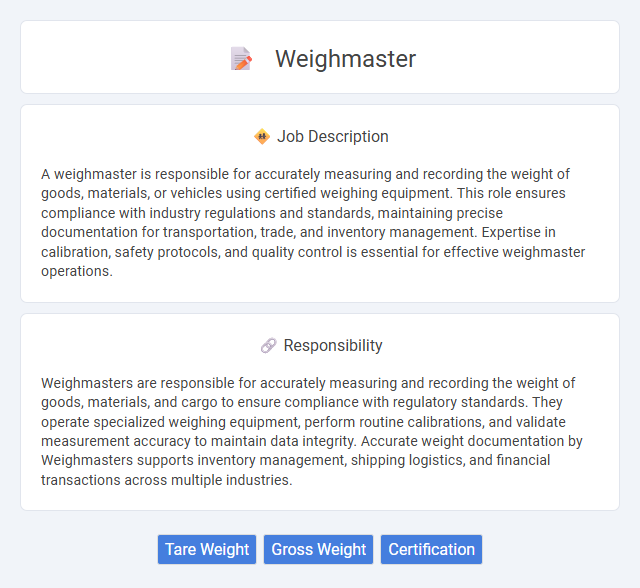
A weighmaster is responsible for accurately measuring and recording the weight of goods, materials, or vehicles using certified weighing equipment. This role ensures compliance with industry regulations and standards, maintaining precise documentation for transportation, trade, and inventory management. Expertise in calibration, safety protocols, and quality control is essential for effective weighmaster operations.
People with strong attention to detail and good numerical skills are likely suitable for the Weighmaster job, as accuracy in measuring and recording weights is crucial. Individuals who can work under pressure and maintain focus during potentially repetitive tasks may also thrive in this role. Those with physical stamina and the ability to handle equipment safely might have a higher probability of success in this position.
Qualification
A Weighmaster must possess certification or licensing as required by state or federal regulations to ensure accuracy and compliance in weighing operations. Essential qualifications include proficiency in operating weighing equipment, strong attention to detail, and knowledge of relevant safety and operational standards. Experience in logistics, transportation, or industrial settings is often preferred to manage the documentation and validation of weight data effectively.
Responsibility
Weighmasters are responsible for accurately measuring and recording the weight of goods, materials, and cargo to ensure compliance with regulatory standards. They operate specialized weighing equipment, perform routine calibrations, and validate measurement accuracy to maintain data integrity. Accurate weight documentation by Weighmasters supports inventory management, shipping logistics, and financial transactions across multiple industries.
Benefit
A Weighmaster job likely offers significant benefits related to precise measurement control and quality assurance, which can enhance operational efficiency and reduce material waste. The role may improve accuracy in inventory management and billing processes, potentially increasing profitability for the company. Working as a Weighmaster could also provide opportunities for skill development in regulatory compliance and equipment calibration.
Challenge
Weighmaster positions likely involve challenges related to maintaining precise weight measurements under varying environmental conditions, which can impact accuracy. The role may demand meticulous attention to detail and compliance with regulatory standards, increasing the likelihood of stress during peak operational periods. Managing equipment calibration and troubleshooting measurement discrepancies are also probable obstacles that require technical expertise.
Career Advancement
Weighmasters specialize in accurately measuring and recording weights for various industries, ensuring compliance with legal and regulatory standards. Career advancement in this field often involves gaining certifications such as Certified Weighmaster or Certified Weight Examiner, which enhance credibility and open opportunities for supervisory or managerial roles. Experienced Weighmasters can progress to positions like Quality Control Manager, Compliance Officer, or Operations Supervisor within logistics, manufacturing, or transportation sectors.
Key Terms
Tare Weight
A Weighmaster plays a crucial role in accurately determining the tare weight, which is the weight of an empty vehicle or container used to subtract from the gross weight to obtain the net weight of the cargo. Precise tare weight measurement ensures compliance with regulatory standards and prevents discrepancies in freight charges. Mastery in using calibrated scales and maintaining detailed records is essential for a Weighmaster to deliver reliable tare weight data.
Gross Weight
A Weighmaster is responsible for accurately determining the gross weight of shipments, ensuring compliance with industry standards and regulatory requirements. Utilizing calibrated scales and sophisticated weighing equipment, the Weighmaster records precise measurements that are critical for logistics, freight billing, and inventory management. Maintaining detailed documentation of gross weight data supports operational efficiency and minimizes discrepancies in transportation and storage processes.
Certification
Weighmasters must obtain state-specific certification to legally operate and verify commercial weighing devices, ensuring measurement accuracy and compliance with regulatory standards. Certification programs typically require candidates to pass written and practical exams that test knowledge of federal and state weights and measures laws. Maintaining certification involves periodic recertification and adherence to strict operational protocols to guarantee the reliability of weight measurements in trade.
 kuljobs.com
kuljobs.com